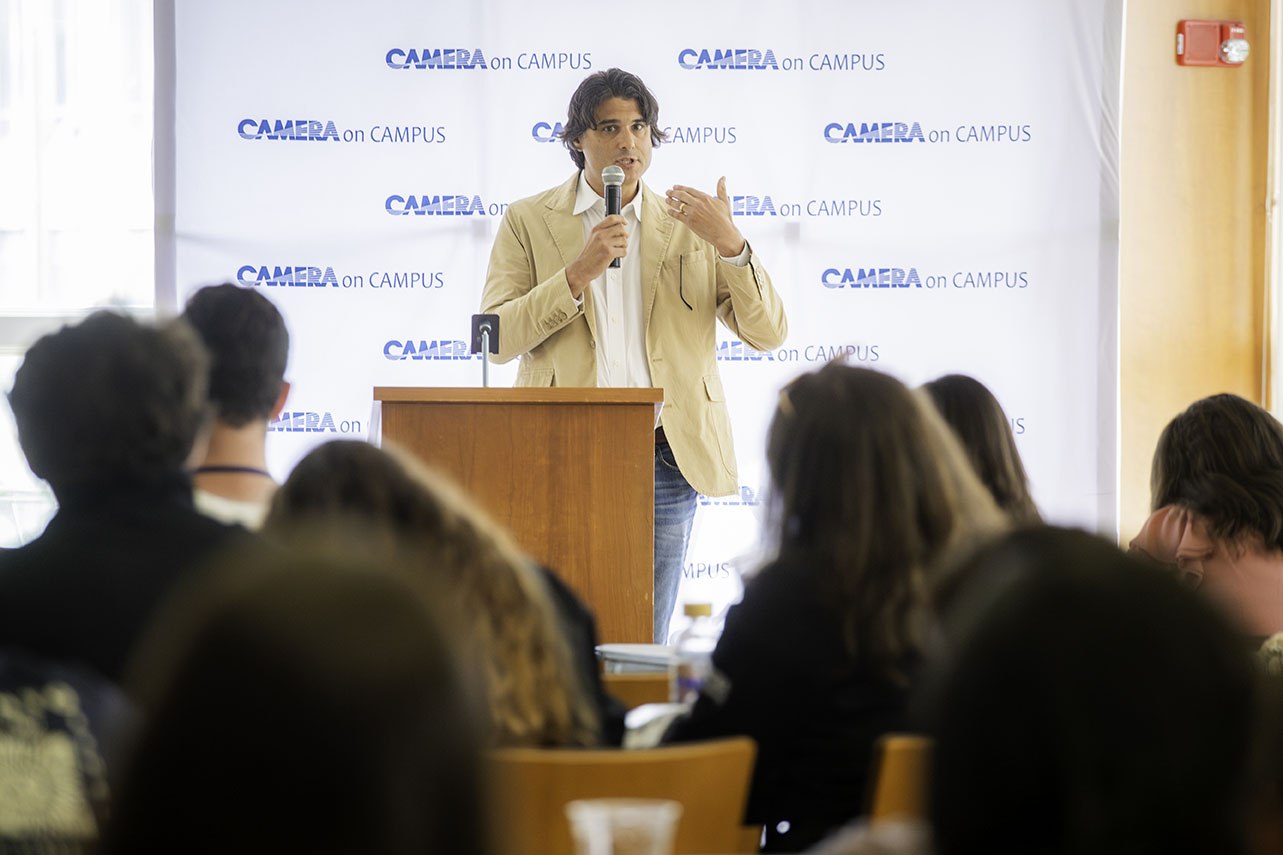Note from Douglas Sandoval, editor of the CAMERA on Campus Blog: This article was written and published by Aaron Bandler, a reporter for the Jewish Journal (Los Angeles). CAMERA on Campus is proud to share their incredible work with our readers.
This year’s CAMERA (Committee for Accuracy in Middle East Reporting & Analysis) on Campus International Student Conference had “a far more serious tone” due to the “unprecedented” rise in antisemitism on campuses since Oct. 7, according to Campus Director Hali Spiegel. The 45 student leaders from the U.S. Canada, Israel and the UK who attended the conference in Boston on July 28-31 were eager to arm themselves with information to fight back against the surge of antisemitism on their campuses.
On the first day of the conference, a panel of students discussed their struggles on campus this past year. Panelist Brooke Verschleiser, a rising senior at Brown University who heads Brown Students for Israel, claimed that she obtained notes from the campus Students for Justice in Palestine (SJP) chapter that justified the Oct. 7 massacre “in the name of resistance.” Verschleiser said that she tried to get the story published in the campus student paper, but was rejected because her source wasn’t “reliable.” “SJP definitely outnumbers us,” she said.
That said, Verschleiser posited that a lot of anti-Israel students are “all bark and no bite,” pointing out that someone had left a note on a dorm room adorned with an Israeli flag that read, “those who support death will die by their own hand.” But no one ever admitted to leaving behind the note, which Verschleiser believes is further evidence that the anti-Israel students hide behind masks and don’t want their identities known.
Verschleiser predicted the upcoming academic school year will be a struggle, as the university made a deal with the anti-Israel encampment occupying campus earlier this year to vote on a Boycott, Divestment and Sanctions (BDS) resolution. She believes that if the resolution passes, the university will just throw their hands up when the Corporation of Brown University inevitably says no; at which point, she expects “all hell to break loose.”
Billy Alexander, a student at England’s University of East Anglia, recalled how the student union at his school issued a statement at his school after Oct. 7 decrying “the ongoing violence in the region” and condemned Israel’s “genocide.” The student union went into the code of conduct and declared their “integrity” to the BDS movement, claimed Alexander. “There was no time to mourn or anything,” Alexander said. He also claimed that the student issued a statement “that was just as bad” when Israel attacked the Iranian regime-backed Houthis in Yemen. Additionally, Alexander claimed two student union elected officers tried to ban him from the union for a year because he mentioned in an email that the two officers are a “disgrace” to their posts. “Apparently that’s considered harassment,” he said. Ultimately, Alexander was not banned.
Even Israeli universities haven’t been immune to anti-Israel activists. Robert May, a student at Ben-Gurion University, said that there have been anti-Israel protests on his campus — including Nakba Day (Arabic for “catastrophe,” which is how Palestinians view the 1948 war) protests — and young Israelis seem to be involved in them. He also claimed that a professor at his school brought a speaker from the Palestine Liberation Organization (PLO) who argued that Israel is implementing apartheid.
May also claimed that around six or seven professors from the university signed onto a letter calling for the Biden administration implement an arms embargo against Israel; May demanded answers from the university president on the matter, to which the university president said that “there’s no place for stuff like this at our university” but in May’s view that wasn’t enough. May did, however, bring Jerusalem Post journalist Michael Starr to campus to discuss how SJP and Americans Muslims for Palestine (AMP) are funded.
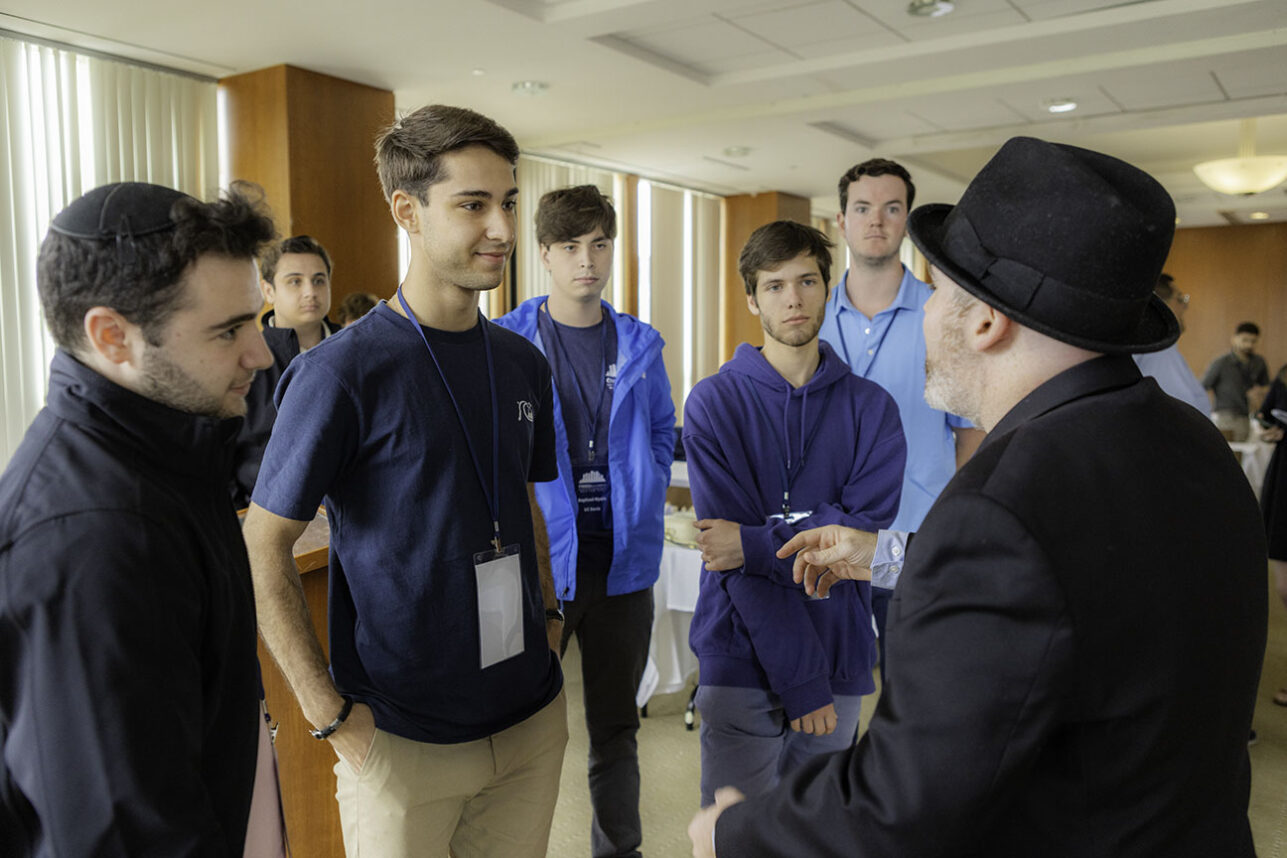
The Journal spoke to other students spoke to at the conference who shared similar stories of their campus experiences this past academic year.
“Sometimes it feels like it’s difficult to exist on campus.” – Raphael Myers
“It was pretty terrible and exhausting,” Raphael Myers, a rising senior at UC Davis, told The Journal. “It’s difficult to describe the amount of hostility on campus toward Jews and Zionists. Whereas before I felt safe going to the library and just going to random places on campus, now the moment classes are over, I immediately head to Hillel. Sometimes it feels like it’s difficult to exist on campus.” He claimed that the UC Davis SJP chapter “has consistently demonized us and dehumanized us, just for believing that Israel as a nation should exist. Many people have been called slurs, specifically the slur ‘zio,’ which was coined by David Duke and the KKK. We have had social media harassment where people have been stalked. We’ve had instances where the encampment has blocked buses during finals. We’ve had all manner of disruption on campus as a result of Palestinian protesters and it has created an atmosphere that is very unwelcoming and for almost all Jewish students … it has made them feel unsafe.” Myers added that when the anti-Israel encampment on campus was dismantled, Popular Front for the Liberation of Palestine and Hezbollah flags were found as well as signs depicting the red triangle symbol used by Hamas to designate targets.
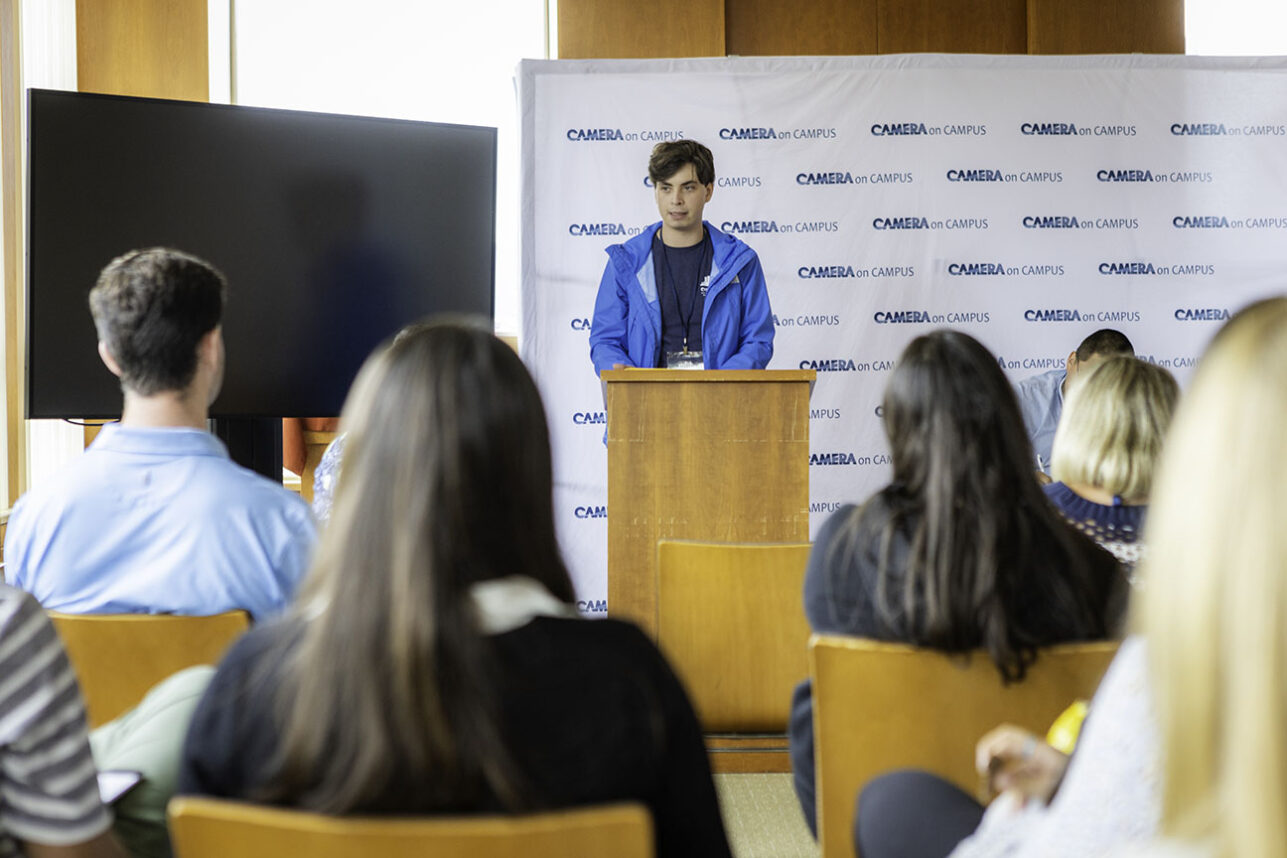
He added it was “frustrating” to see “inaction” from the university administrators on the matter. “The only support network we as Jewish students and Zionist students have is each other, which is I would say a testament to our people’s strength.”
Mayan Zucker, a student at the University of the Arts London, recalled being shouted at on campus that she “should have died in the gas chambers.” Zucker also told me that she received an email from one of her teachers to students of Middle Eastern descent (Zucker was born in Tel Aviv) in her class inviting her to a discussion of the Nakba on Oct. 9 and to “bring spray paint and face masks” to join a protest afterwards. The teacher, who sent the email from their official university account, signed the email with “from the river to the sea, Palestine will be free.” She claimed the university told her that it was “freedom of speech” so there was nothing they could do about it. Zucker believes that the campus climate will be just as intense in the forthcoming academic school year, though she believes that antisemitism at U.S. campuses is more “physical” whereas in the UK it’s more “verbal.”
Information to Fight Back
The conference speakers were invited to educate the students as well as offer tactics and strategies to fight back in the information war. The Israeli Canadian TV personality Shai DeLuca, who spoke on July 31, told the students that they are fighting the war against misinformation right now, which he said “is so important to our existence.” DeLuca debunked various anti-Israel narratives, such as the trope that Israel is committing genocide in the Gaza Strip. He pointed out that the United Nations defines genocide as “proven intent on the part of the perpetrators to physically destroy an ethnic racial or religious group. Cultural destruction does not suffice nor does the intention to simply disperse a group.” He argued that there clearly is no intent on Israel’s part to commit genocide because, if that were true, the war would have been over on Oct. 8. “Why would we send our own soldiers our own children into Gaza … when we could simply carpet bomb the place?” DeLuca called the allegations of genocide against Israel “quite offensive” because it describes “Jewish history” like the Holocaust.
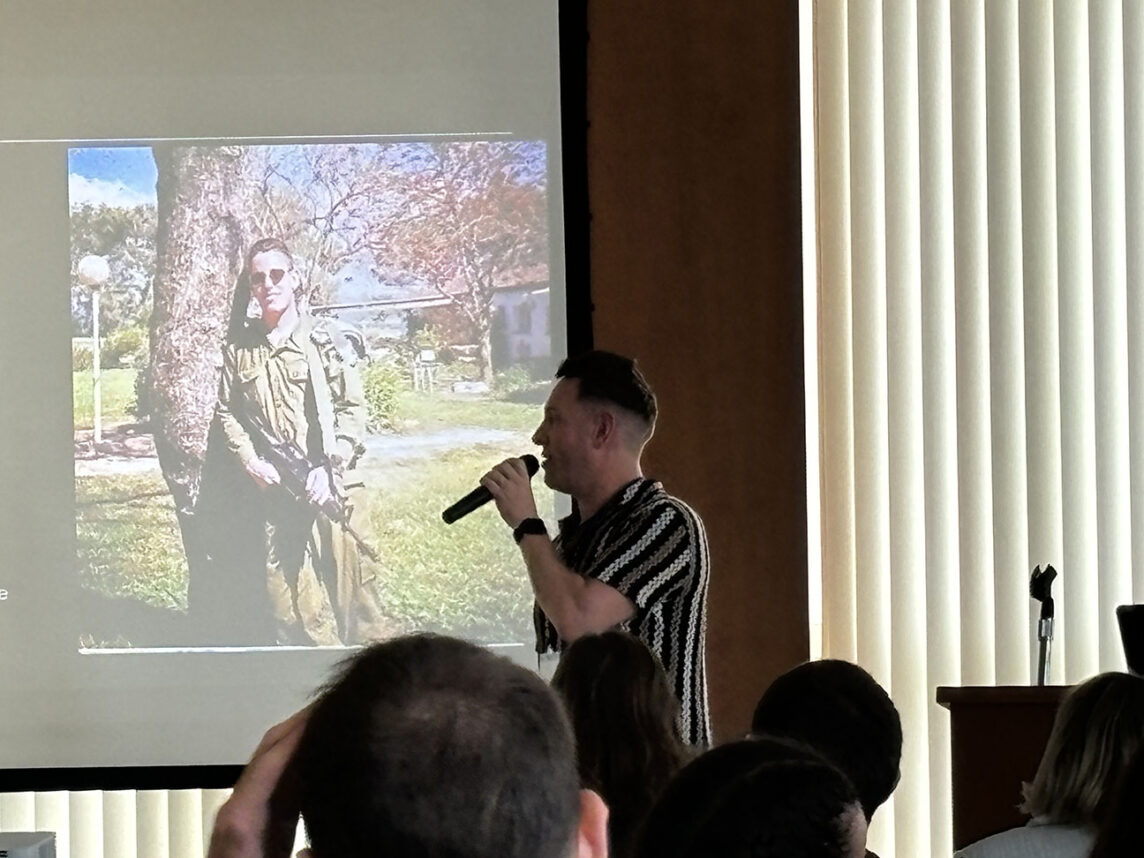
Regarding the claim that Israel is engaging in apartheid, DeLuca pointed out that Israel has “a civil legal system in which everyone is equal.” He recalled that when he served in the Israel Defense Force (IDF) he had an Arab commander who “had control of my entire battalion. We didn’t think anything of it … Israeli Arabs serve in all aspects of Israeli life.” DeLuca also pointed to how an Arab judge convicted a former Israeli president, as well as a video of a Congolese Israeli border patrol officer explaining how he grew up in South Africa and that Israel is clearly not an apartheid state. DeLuca said that when he shares that video at his campus talks, there’s usually a male “as white as Casper” saying he’s wrong. You can’t argue with someone like that, added DeLuca.
As for those who claim Israel is a settler colonial state, DeLuca contended that the “return of Jews to our indigenous homeland after generations of colonization … is actually decolonization.”
DeLuca urged the students to follow celebrities and influencers like Gal Gadot, Montana Tucker, Ritchie Torres and Yoseph Haddad and to develop “allyship with groups outside of the Jewish community” to talk about Israel and being Jewish organically.
Kassy Akiva, a reporter for The Daily Wire who finished her conversion to Judaism a year ago, shared with students some examples of her reporting, including the viral video of Khymani James, a leader of anti-Israel student protests at Columbia University, saying during a livestream that “Zionists don’t deserve to live” (James has since been banned from campus) and a video of a protest at a Connecticut man’s house because he had a yard sign supporting Israel. One of the protesters turned out to be the city of New Haven’s director of community engagement, who Akiva said was subsequently put on unpaid leave for bit. She proceeded to go over some examples of online antisemitism and guided students on how they should handle it. For instance, a post on X telling Akiva not to “be surprised when you meet the same fate as Meir Kahane” — the Jewish Defense League founder who was assassinated in 1990 –– was reported to the FBI. Akiva responded to a post on X that contorted a picture of her husband proposing to her into a swastika by mocking it, telling the X user that she’ll make another Jewish baby “each time you tweet something antisemitic.” Dumb replies that get little views should be ignored, she told the students. Akiva believes that the campuses are lost but sees “glimmers of hope,” citing people like Bill Ackman pulling funding from universities and Claudine Gay stepping down as president of Harvard University.
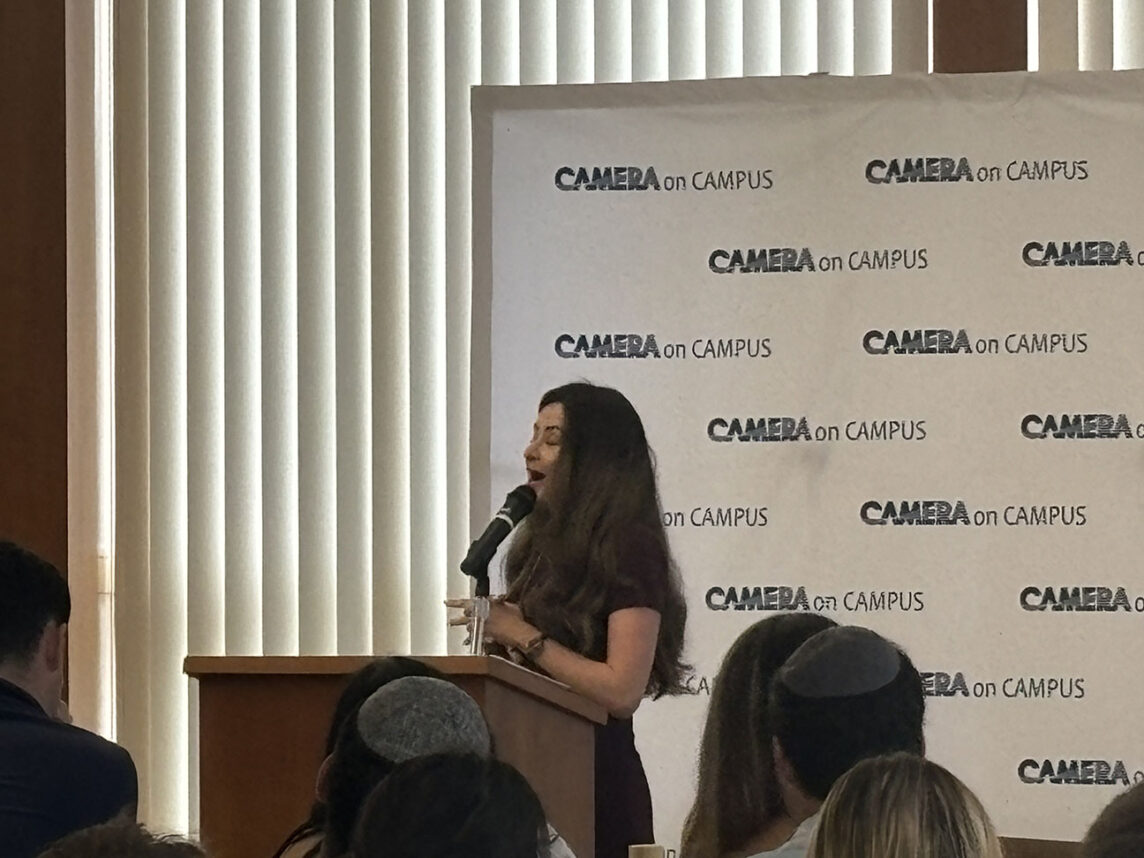
Other speakers at the conference included CAMERA Senior Analyst David Litman, Director of Communications Jonah Cohen and Associate Director Alex Safian.
Zucker told The Journal that the information she learned at the conference was “absolutely” helpful. “I have taken more notes and been given more information than I know what to do with,” she said, pointing to Cohen’s talk where he provided tips for debating anti-Israel narratives. One of Cohen’s tips was the “Gadfly method” of debating in which you simply ask three questions in response to an argument: What do you mean by that, why do you think that particular claim is true and then ask leading questions to expose holes and inconsistencies in a person’s argument. An example he pointed to was when Alexi McCammond, then a journalist for Axios, asked the Ben & Jerry’s co-founders in 2021 if they supported boycotting Texas and Georgia over their abortion and voting rights laws following the ice cream company’s Israel boycott.
